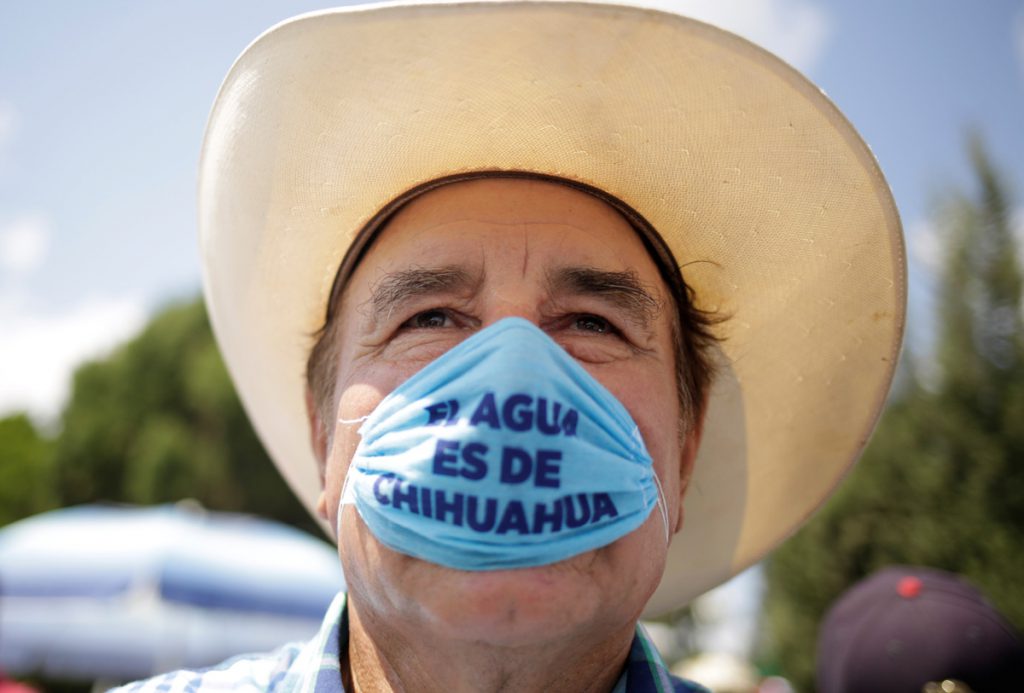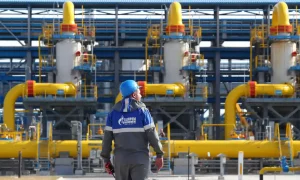Have you ever wondered what you would do without water? Water is indeed life. And without access to clean water, life’s hardships become further amplified. For many people in the US, water is a resource that they take for granted as it reliably flows through our fingers when we open a faucet in the kitchen or bathroom. Despite nearly 71% of the earth covered by water, large segments of people have little to no access to water. Recently, farmers in Chihuahua, Mexico, realized the precarious situation they found themselves in while enduring the drought at the same time that impending water payments were due because of a treaty with the United States that intended to promote water security in both countries. Mexican farmers faced with the harsh reality that they might not have water for their next harvest. The idea of this possibility prompted farmers and other citizens around the state to protest by blocking highways and showing up at dams. Tensions between the Mexican government and its constituents reached an all-time high when a protester was killed on September 8, 2020 by a Mexican national guard. So, how did the fight over water turn deadly?

To understand the severity of the issue, one must first go back to the ratification of the water treaty between the two countries. In 1944 The United States of America and Mexico signed the treaty “Utilization of Waters of the Colorado and Tijuana Rivers and of The Rio Grande”. This treaty was created to ensure the water security of both countries through the sending of water between each country.1 Every year the United States sends nearly 489 billion gallons of water from the Colorado River to their neighbor Mexico. Unfortunately, Chihuahua receives little to no water from this treaty. Most of the water sent by the United States is delivered to bordering states such as Nuevo Leon and Tamaulipas. Moreover, while they receive a small portion of the United States’ water payments, the state of Chihuahua sends more than half of the 114 billion gallons Mexico sends to the US each year. This has burdened the farmers of Chihuahua in recent years as they try to irrigate their own crops.2 Chihuahua is home to the biggest production of nuts and chilies in Mexico. In fact, Chihuahua produced 79,934 metric tons worth of pecans in 2015. This accounted for 65% of all pecan production in Mexico. when one considers that pecan trees require an estimated 34,000 gallons per year, it is easy to see why Chihuahua needs to retain as much water as they can in their dams for their farmers.3

Still, in 2020, Mexico fell behind in its payments to fulfill the requirements of the treaty of 1944. The country reportedly owes 345,600 acre-feet of water which is due by October 24th. This deficit accounts for 88% of what Mexico owes within the five-year quota. The President of Mexico, Andrés Manuel López Obrador, wants to make the payment and is relying heavily on Chihuahua to deliver most of that payment through its dams. As he sees it, it is in the best interest of the country to make the payment, since the United States sends more water to Mexico than Mexico sends back. The Mexican President also fears that President Trump will impose tariffs on Mexican products if Mexico fails to meet the requirements set forth by the treaty.4 However, Chihuahuan farmers know the effect the payment would have on their livelihoods. The transfer of the water Mexico owes to the United States would drastically decrease the water levels within Chihuahua, which would result in an exponential decrease in production as well. Fearing the future implications that the fulfillment of the treaty would have on their farms, Chihuahuan residents decided it was time to take a stand.5
Since the start of the year, Mexicans have been protesting the decision to pay for the treaty with Chihuahua’s limited water resources but the biggest protest came in September. In September, 2,000 farmers marched up to the dam name La Boquilla after hearing that the Mexican government had diverted increments of water to the United States instead of meeting the agreements it had with the farmers.6 Protesters were able to gain control of the dam when they overpowered law enforcement. As the news broke about the protest, the Mexican National Guard was deployed to La Boquilla Dam. Farmers first tried to dialogue and to preserve this resource, but they soon started feeling as though their needs were not being heard and escalating into violence. Confrontations between the two parties became more violent as farmers started setting fire on the dam’s infrastructure and damaging police vehicles in hopes that it would send a message to the government or gain more recognition from the media. Amidst all the commotion of the protest, a national guard shot and killed a woman protester and severely injured her significant other. Jessica Estrella Silva Zamarripa was the daughter of pecan farmers and the mother to three children. She was bravely fighting for her human right to water when she was killed. Her death shed a light on the issue of water distribution and has become a source of motivation from people all over Mexico.7

Meanwhile, President Andrès Manuel Lòpez Obrador attempted to downplay the protests and the severity of the issue. He went on record stating the protests had been staged by his political opposition.8 In a press conference, the President named 17 politicians who he says funded the fake protests. Andrès Manuel Lòpez Obrador has also attempted to gain more support from the Mexican population at large by stating he will request for the United Nations to complete a study to ensure that the United States is actually sending the amount of water that they say they are sending. Moreover, the President of Mexico assured his constituents that he will take matters into his own hands, saying he will personally appeal to the President of the United States to renegotiate the amount that Mexico owes or at least the terms by which that payment is made.9
With low rainfall and a large water debt payment looming, the Mexican government faced a dilemma. On one hand, the Mexican government wanted to keep good diplomatic ties with its neighboring country. Failure to make the payment could potentially result in sanctions on Mexican goods, which would affect more than the agricultural production of Chihuahua. On the other hand, if the payment of the water owed was made, President Andrès Manuel Lòpez Obrador could further alienate the people of Chihuahua. The transfer of the 345,600 acre-feet of water to the United States would leave Chihuahuans unable to water their crops for the following season. The President’s negligence regarding the issues provoked protests all over the State of Chihuahua against the violation of their human rights to preserving their water, their crops, and their lives.
Finally, on October 22, 2020, two days before the deadline for the water payment, Mexico and the United States reached an agreement that would account for the 345,600 acre-feet of water that was owed. The last-minute deal would hand over the rights of Mexico’s share of the water from the Amistad and Falcon dams to the United States. The terms of the agreement would reportedly spare Chihuahua with enough water for the next farming season. The deal would also implement “workgroups to analyze and develop water management tools to provide for increased reliability and predictability in Rio Grande water deliveries to users in the United States and Mexico”.10 While Mexico was able to fulfill the treaty requirements, it came at a huge cost to the country. Ultimately, the potential risk of water insecurity in the state of Chihuahua cost Mexico thousands of dollars worth of infrastructural damage plus the loss of life for one of its citizens, a young mother.
- “Utilization of Waters of the Colorado and Tijuana Rivers and of the Rio Grande” Accessed October 16, 2020, https://www.usbr.gov/lc/region/pao/pdfiles/mextrety.pdf. ↵
- Pamela Constable, “Mexican Farmers Occupy Dam to Stop Water Payments to the United States” Washington Post, https://www.washingtonpost.com/world/the_americas/us-mexico-water-dam-farm-protest/2020/09/13/dddb85e8-f3bb-11ea-999c-67ff7bf6a9d2_story.html, Accessed October 16, 2020. ↵
- Julio López-Díaz, “The Pecan Industry in Chihuahua Mexico: Challenges and Successes,” https://aces.nmsu.edu/ces/pecans/documents/9%20Lopez%20Diaz.pdf. ↵
- Mark Stevenson, “Mexico Struggles with U.S. Water Debt, Suggests U, N, Audit,” September 3, 2020, https://www.pbs.org/newshour/politics/mexico-struggles-with-u-s-water-debt-suggests-u-n-audit, Accessed October 16, 2020. ↵
- Pamela Constable, “Mexican Farmers Occupy Dam to Stop Water Payments to the United States” Washington Post, https://www.washingtonpost.com/world/the_americas/us-mexico-water-dam-farm-protest/2020/09/13/dddb85e8-f3bb-11ea-999c-67ff7bf6a9d2_story.html, Accessed October 16, 2020. ↵
- Mexico News Daily. “National Guard Backs off after Tear Gas Fails to Dislodge Chihuahua Farmers,” September 9, 2020. ↵
- Pamela Constable, “Mexican Farmers Occupy Dam to Stop Water Payments to the United States” Washington Post,https://www.washingtonpost.com/world/the_americas/us-mexico-water-dam-farm-protest/2020/09/13/dddb85e8-f3bb-11ea-999c-67ff7bf6a9d2_story.html, Accessed October 16, 2020. ↵
- Eoin, Wilson, “Mexico’s Water Crisis Heats up as Transfer to US Looms”, https://www.aljazeera.com/news/2020/10/8/mexico-water-crisis-heats-up-as-us-transfer-deadline-looms, Accessed November 2, 2020. ↵
- Patrick McDonnell, “Mexican Water Wars: Dam Seized, Troops Deployed, at Least One Killed in Protests about Sharing with US”, https://www.latimes.com/world-nation/story/2020-09-11/mexican-water-wars-dam-seized-troops-summoned-at-least-one-killed-in-dispute-about-water-sharing-with-u-s September 12, 2020. ↵
- Mark Stevenson, “Mexico Reaches Deal to Pay Water Debt to US”, https://abcnews.go.com/International/wireStory/mexico-reaches-deal-pay-water-debt-us-73768266, Accessed November 9, 2020. ↵



68 comments
Michaell Alonzo
In modern-day life, most people generally take for granted the privilege they enjoy of having life essential resources in surplus amounts. Some don’t even realize how lucky they are to have certain, and at times life-essential goods that others can only wish and pray they had, with water being one such good. Water is a resource that many Americans in the US take for granted because it consistently flows through our society, but there are some countries that don’t have enough water to survive. I found this article interesting, and it was heartbreaking to find out that a life was lost fighting for what many would deem a basic human right. People have been fighting for access to water, but it took an individual’s death to bring to attention the problem of water distribution and inspire people all around Mexico. While I recognize that Mexico was in a complicated position, debating whether to maintain ongoing diplomatic contacts with its bordering neighbor, with possible sanctions on Mexican exports could have been imposed if the payment was not made, which would have an impact on more than just Chihuahua’s agricultural output. But on the other hand, if the water debt was paid, the President may further enrage the Chihuahuan populace by their needs of survival not being heard. Neither of these options justifies the President’s action of publicly saying that his political rivals were behind the protests. By doing so, he tried to downplay the demonstrations and the importance/ severity of the problem. In the end, Mexico had to pay thousands of dollars in infrastructure damage due to the potential for water insecurity in the state of Chihuahua, in addition to losing one of its people, a young mother.
Natalia Bustamante
This is a truly devastating circumstance that happened in Chihuahua. I was not aware of the treaty and agreement Mexico and the United States had. However, the president’s response and action were very limited and provided no aid. I had recently heard about a similar situation occurring in Monterrey, Nuevo Leon. It is one of the largest metropolitan cities in Mexico, and they had been experiencing very limited water sources. And similar to how the president acted on the Chihuahua crisis, AMLO understated the situation, which led to a health crisis for many residents in Monterrey. A very interesting and well-written article, Andres.
Esmeralda Gomez
What an interesting topic! I truly had no idea of the water insecurities that Chihuahua was facing, much less how America has had such a large impact on furthering that insecurity. I hope that sooner or later, a permanent solution comes to fruition that can help alleviate the water issues in Chihuahua, but also one that can help mend the ties between Mexico and the United States more. I loved how the article flowed, the introduction was truly a staple piece.
Matthew Holland
The issues in this article are heartbreaking and universally understood, the need for water is imperative to life but it is too often forgotten how difficult it is for some people to have access to basic necessities for life. The other heartbreaking issue is that of the protester that was killed for trying to use their basic human rights to bring attention to this serious issue. Completely negating their ability to engage with their fellow citizens to enact real change to their community.
Karicia Gallegos
This article really opened my eyes on the water scarcity around the United States, but especially in Mexico. I had no idea about the treaty between the United States and Mexico. Water is a basic necessity for our everyday life’s and it is so sad that large amounts of people have little to no access to it. Overall, this article was very informative and the author did a wonderful job at spreading awareness about what is going on in other parts of the world.
Amy Hotema
This article is so heartbreaking yet so accurate. I was unaware of this specific incident or the agreements between Mexico and the US, but it breaks my heart that the Mexican president at the time minimized the tragedy. The government’s poor management of the matter hurts the people who depend on the water to cultivate their crops and earn a living. I can only hope that in the future Mexico’s government starts to take more initiative and profit from these sorts of deals. I currently have a family that is struggling to get water even to cook, clean and shower. To the point where we had to take purified water to our family in Mexico.
Camryn Blackmon
I knew there were issues globally with water scarcity and it becoming more prevalent, but I didn’t realize it was happening in Mexico, but I also didn’t realize the deal with water between the United States and Mexico. I think it is important that you spread awareness on this issue in Mexico because it seems like this is happening in many other countries.
Haley Ticas
I never knew about the crisis currently going on in Mexico until I read this article. It is very sad and discouraging that the lack of water is not from the loss of product, but due to the government and an agreement that they had signed. The protests should also continue to happen until they are given this basic necessity of life. Im glad I got to learn about this and read the article, very interesting.
Edward Cerna
This is such a great article and it had a really strong introduction which really brought me in. This was a very informative article that educated me a great deal on a topic that I did not know about. I think it is awesome that you wrote about this on this platform as it is bringing awareness of this subject to the masses. I had not known of this deal between Mexico and the U.S and it was surprising to me because I had just not expected it. Overall, this was a very good article to read as it was very well written and easy to follow.
Monserrat Garcia
This is such a devastating yet utterly true article. I had not heard about this particular instance or the treaties that Mexico and the US have but the fact that the current President of Mexico downplayed the situation is heartbreaking. The people who need the water to plant their crops and make a living are suffering from the government’s mishandling of the situation. I only hope that in the future the government of Mexico actually begins to be more proactive and benefit from these kinds of treaties.